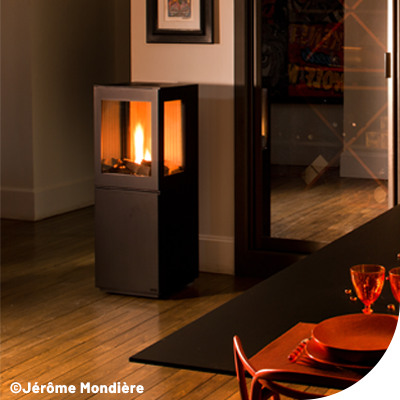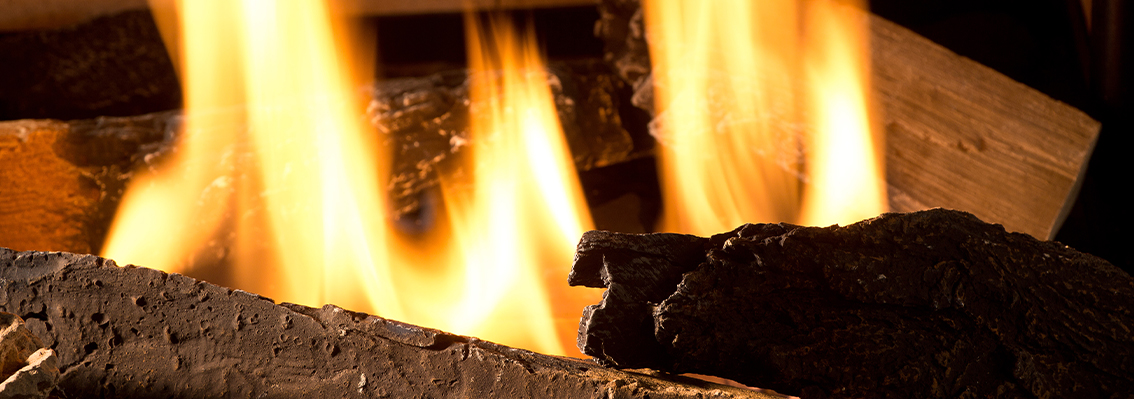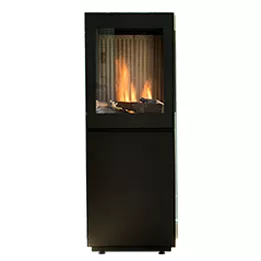 What is a bioethanol stove?
What is a bioethanol stove?
A bioethanol stove is a supplementary heating device that works by burning bioethanol, a fuel derived from the fermentation of plants (such as sugar beets or cereals). A bioethanol stove produces heat without emitting smoke, ash, or significant odor, and requires no flue. This ease of installation makes it an ideal solution for apartments, rentals, vacation homes, hotels, guesthouses, or tiny houses.
With its contemporary design and authentic flames, it blends elegantly into any interior, creating a warm and inviting atmosphere.
How does a bioethanol stove work?
The operation is simple and accessible to everyone. The stove is supplied by a 10 L bioethanol container placed directly inside the device, which automatically feeds the burner.
Once lit, it produces a real flame that radiates heat throughout the room. No chimney or complex installation is needed, making it ideal for apartments or houses without a flue.
The Uni(k)4 model is equipped with an innovative burner developed by SEGUIN, allowing you to adjust the flame via remote control and choose among four power levels for greater convenience and comfort.
Additionally, the Uni(k) range by Seguin includes flame regulation systems and secure tanks for safer and more practical use.
What are the advantages of a bioethanol stove?
A bioethanol stove appeals to many users thanks to a unique combination of practicality, performance, and aesthetics. Its main benefits include:
-
Easy and flexible installation without a flue
No chimney, flue, or heavy construction is required. This makes it a perfect solution for all types of homes, whether a modern apartment, an old house, or even an office. You can enjoy supplementary heating quickly without technical constraints.
-
Mobility and adaptability
SEGUIN bioethanol stoves stand out for their adaptability. The Uni(k)4 stove is lightweight, fitted with discreet casters, and can be easily moved from one room to another. This flexibility lets you adapt heating to your needs: warm up a living room for a cozy evening, create a comfortable corner in a sunroom, or enjoy a relaxing break in a calming bubble.
-
Minimal maintenance and ease of use
Bioethanol stoves produce no soot, ash, or smoke, which greatly reduces upkeep. Regular burner cleaning and periodic tank checks are enough to keep the unit in perfect working order, making it especially convenient for daily use.
-
Design, atmosphere, and visual comfort
Beyond heating, a bioethanol stove adds decorative value. The sight of real flames provides instant visual warmth and creates a friendly, soothing ambiance. High-performance models from the Uni(k) range by Seguin combine even heat distribution with stylish design, turning the stove into a centerpiece of your home.
-
Installation versatility
Thanks to these features, bioethanol stoves can be installed in spaces where traditional heating would be difficult: apartments, offices, sunrooms, tiny houses, or modular rooms. They offer an efficient and elegant way to quickly create a cozy atmosphere without renovation or technical hurdles.
 What is the autonomy of a bioethanol stove?
What is the autonomy of a bioethanol stove?
Autonomy depends on the model and tank size. In general, a bioethanol stove can run between 8 and 14 hours continuously. More advanced models, such as those in the Uni(k) range, can operate for up to 27 hours.
The Uni(k) line goes even further with built-in automatic pumping and four power levels, allowing consumption to be optimized according to needs. Combined with a 10-liter container, the device offers up to 27 hours of heating without refilling—ideal for maintaining a pleasant, warm atmosphere over long periods without constant monitoring.
However, it is important to note that while effective at heating a room, a bioethanol stove does not replace a primary heating system. It is designed as a complementary solution to provide targeted warmth in living spaces.
What about consumption and cost of heating with bioethanol?
One of the main advantages of a bioethanol stove is its ease of use and control over energy consumption. Depending on the selected power level and operating mode, a stove typically consumes between 0.4 and 0.7 liters per hour. At minimum power, it provides gentle heating and extends autonomy, while at maximum power, heat output is stronger but consumption increases accordingly.
As of 2025, the average price of bioethanol ranges from €2.23 to €5.20 per liter depending on the purchase volume (source: höfer-shop.com). Compared to other types of supplementary heating, bioethanol offers an attractive cost-to-comfort ratio.
Safety and maintenance: an easy-to-use stove for daily life
One of the major strengths of the Uni(k) range is its built-in safety features and low maintenance, making it perfectly suited for everyday use.
Safety is a priority. Uni(k) models are equipped with advanced systems to control the flame:
- Temperature and CO₂ sensors: continuously monitor ambient conditions and stove temperature. If a critical CO₂ level or overheating is detected, the system automatically triggers a warning or safety shutdown.
- Automatic shutoff: the stove switches off immediately in case of overheating or fuel shortage.
- Safe bioethanol handling: the fuel is stored in practical liquid containers that are easy to handle. They should simply be kept in a dry, ventilated place, out of children’s reach.
By following these simple precautions, the stove can be used safely and reliably—even in households with children or pets. With proper installation and minimal supervision, a bioethanol stove becomes a practical, stylish, and safe heating option, providing pleasant warmth without the drawbacks of traditional systems.
How to choose your bioethanol stove?
Choosing a bioethanol stove is not just about selecting a decorative piece—it’s about finding a device that combines efficiency, safety, and comfort. Key criteria to consider include:
-
Real heating power
The Uni(k) range by Seguin offers power suitable for rooms over 28 m², ensuring even heat distribution and immediate comfort. With SEGUIN devices, your stove can meet all your needs.
-
Integrated safety
A good bioethanol stove should feature reliable safety systems: automatic shutoff in case of overheating, anti-tip protection, and secure burners. These functions allow peace of mind, even in homes with children or pets.
-
Autonomy
Autonomy (the burn time per tank) varies with reservoir size and burner power. Longer autonomy reduces refills and makes everyday use easier, especially if you use the stove regularly as supplementary heating.
-
Mobility
One of the main benefits of bioethanol stoves is mobility. You can move them from room to room depending on your needs—provided they are switched off and completely cooled. This creates flexible heating for apartments or modular homes.
-
Design and customization
A bioethanol stove is also a decorative element. Models like the Uni(k) range feature clean lines, varied materials, and customizable finishes to suit any interior—from a modern living room to a cozy sunroom or a stylish office.
-
Efficiency
The efficiency, meaning how well the stove converts bioethanol into heat, directly affects comfort and consumption. A high-performance stove ensures steady, lasting warmth while minimizing effort—an important factor for convenience and peace of mind.
Durability and investment: a long-lasting supplementary heater
Investing in a bioethanol stove means choosing a robust, durable appliance. Built with quality materials, these stoves can last for many years. They require little maintenance and adapt to different spaces as needed.
The Uni(k) range by Seguin offers high-performing models with up to 4.5 kW output—reliable units that combine modern design with thermal comfort. Choosing a bioethanol stove therefore means enjoying aesthetics, convenience, and targeted warmth in your home without heavy constraints.




